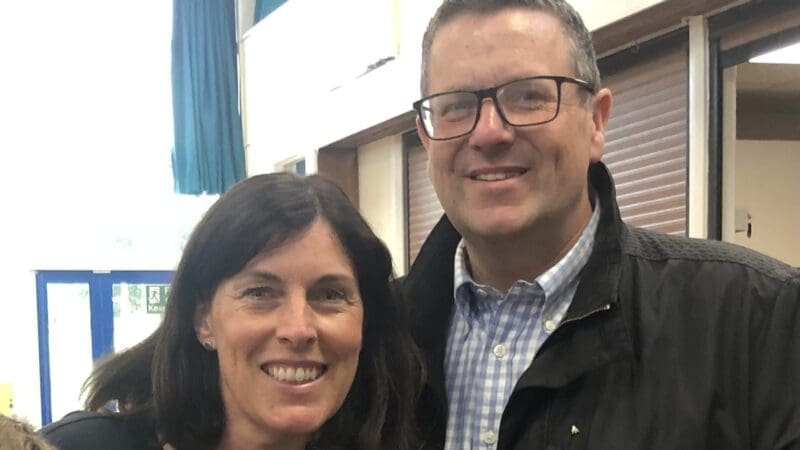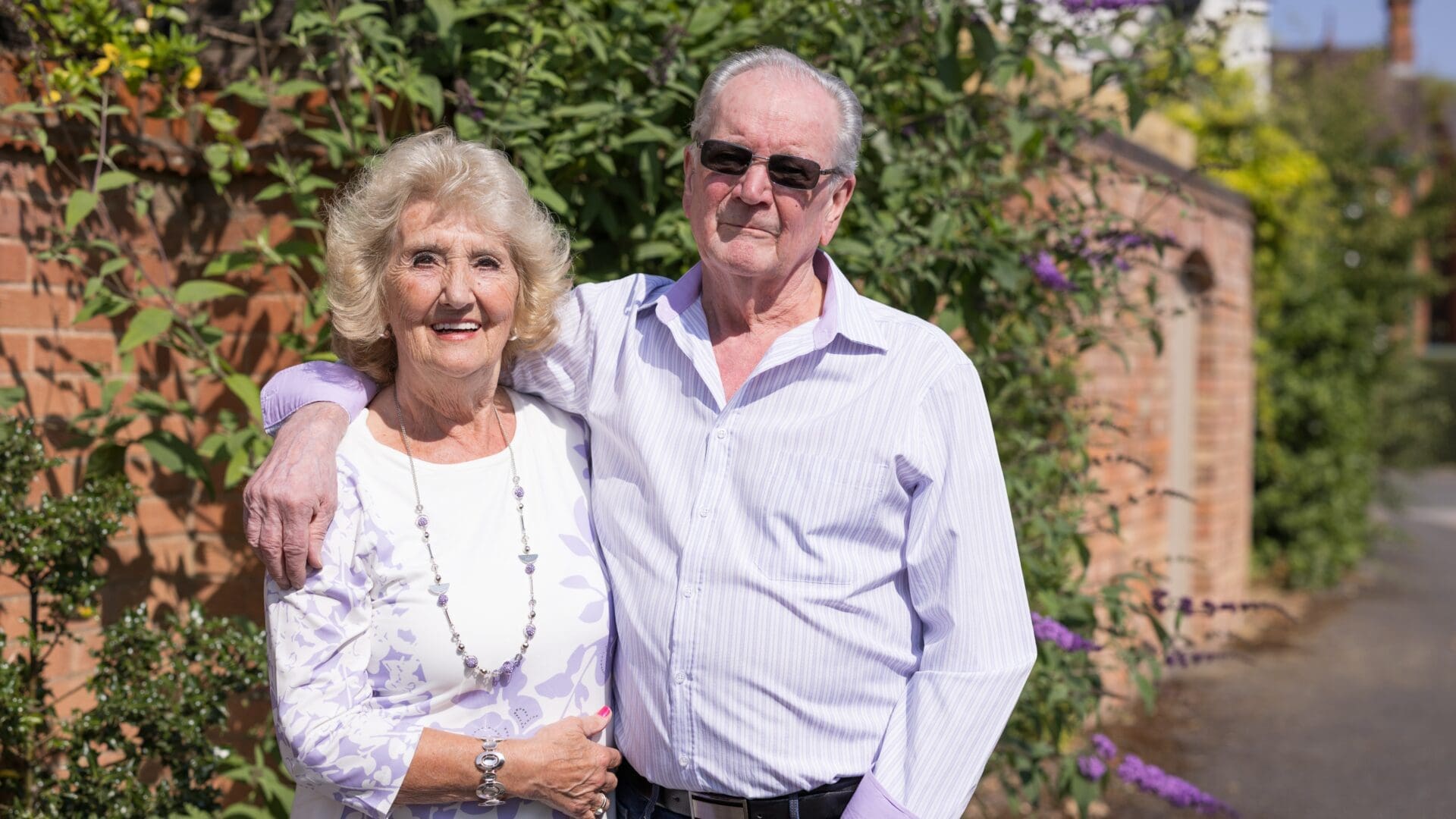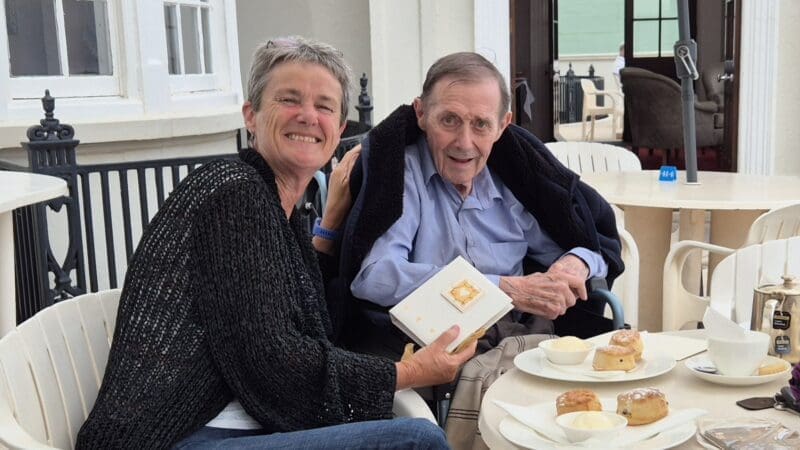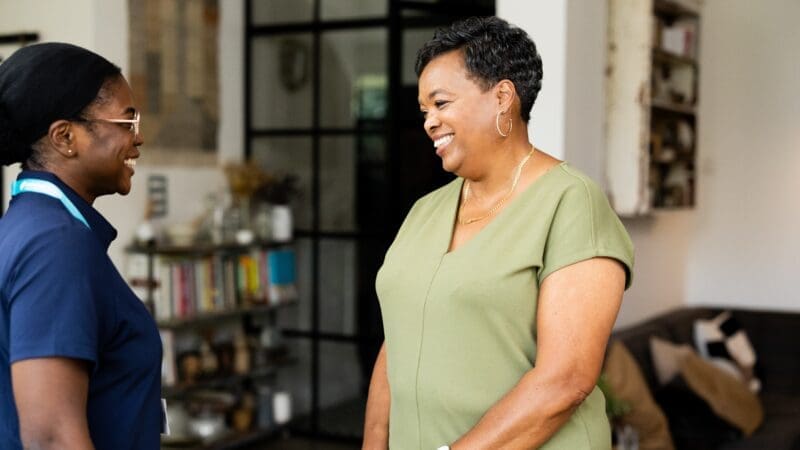
Sarah’s story – “Dementia UK was our saving grace”
Sarah reflects on reaching crisis point when her husband, David, was diagnosed with young onset dementia and the support her family have since received from Dementia UK.

Sylvia and George share the importance of having open conversations in order to cope with Sylvia’s diagnosis of Alzheimer’s disease.
George: Sylvia and I met at a Christmas party. It was love at first sight and we’ve been happily married for 56 years. Our relationship has stood the test of time because we’re always honest and patient. We don’t expect each other to be perfect, and when the chips are down, we face it together.
Sylvia: I once asked my Mum, “Is there such a thing as love?” She replied, “When you don’t need to ask the question, that’s when you will know the answer.” I knew the answer when I met George. After our first date, I knew I wanted to marry him. He has always been a strong, honourable man who treated me as his equal. We went on to have two children, Loraine and Lisa – we’ve always been the A-team.
Sylvia: My mum, aunt and sister all lived with Alzheimer’s disease, so I knew the signs to look out for. I started to struggle with confusion and spatial awareness in early 2019 and was referred to the memory clinic.
Before the appointment, I had a very honest conversation with my daughters. I asked them both to sit down on the bed at home and said to them, “Be honest, girls – do you think I have Alzheimer’s?” They both said yes straight away. I agreed with them, but to hear it from someone else was a bit of a shock.
The nurse at the health centre had a conversation with me about getting assessed as soon as possible. She said that if I got a diagnosis of Alzheimer’s disease early, there may be more we could do to slow the progression. This was the best advice I was given. When I was diagnosed with Alzheimer’s disease in August 2019, I got straight on medication and did everything I could to get my brain firing on all cylinders.
When I was first diagnosed, I felt like I was on a cliff, hanging on with my fingers, and I was terrified I was going to fall. I needed someone to catch my hand and pull me up. George and the girls reassured me that they would look after me; they were my hand-catchers.
George: When Sylvia was diagnosed, I saw a tear in her eye. It really touched me. I told her that I would do everything I could to look after her and that she didn’t need to worry.
Ever since we got married, caring for our family and children has been important to me. And then as we’ve grown older, dementia has crept in. So, I’m still caring like I always have done, but in a different way. I’ve had to adjust and adapt to the situation.
I’m very proud of Sylvia and the way she has handled her diagnosis. She has taken everything in her stride. I think she’s brilliant.
Sylvia: Alzheimer’s disease is a bully. It tries to steal from you. The hardest part for me has been the loss of freedom. Not being able to drive, cook or even run the bath without help from George. But Alzheimer’s will never take away our love. George and I have not let it beat us. Instead, we have accepted it and found ways to live alongside it.
I have the best husband and best carer in the world. George is not just my rock; he is my mountain. Everyone should have a George.
Sylvia: Communication is so important for people living with dementia. We need calmness, laughter and love. I try to avoid any negative conversations, especially with George. We are like chalk and cheese, which is why we are such a good match! We do like a debate, but we don’t carry on if the conversation gets heated. We just say, “If you say so, dear” and it immediately neutralises everything.
Having open and honest conversations as a family has helped us to develop coping strategies. My daughters let me know that I sometimes repeat the same story four or five times. We have a code where they will rub their nose if I’m repeating myself in a conversation, so that I know.
I’m in the early stages of dementia and so I can still communicate well with my family. They see into my mind, and I can still read their emotions. But I believe that we can also communicate through touch and body language. We’re a family that speaks with our eyes and our hands. My biggest fear is that one day I’ll look at my loved ones, and my eyes will be blank, and I won’t respond. But even just holding hands is enough to let someone know you are there. Love is the best medicine.
Sylvia: For people who haven’t got family to speak to, I say please reach out to Dementia UK and its specialist Admiral Nurses. You can also get support from your wider community; there are often fantastic carers’ groups available. Sometimes you just need somebody to speak to and to feel heard.
My advice to anyone who is diagnosed with Alzheimer’s disease is to not jump through time and start worrying about what will happen 10 years down the line. Hope is the most important thing you must hold onto.
Our dementia specialist Admiral Nurses can help, whether you need an immediate answer or emotional support. From practical tips for caring and compassionate guidance to planning for the future, they are a lifeline. Dementia UK’s Admiral Nurses can support you in many ways.

Sarah reflects on reaching crisis point when her husband, David, was diagnosed with young onset dementia and the support her family have since received from Dementia UK.

Jo reflects on the support she has received from her Admiral Nurse, Liz, since her husband was diagnosed with dementia.

Safia, a dementia specialist Admiral Nurse for the Black, African and Caribbean Communities, speaks to Elene, whose mum lived with dementia. They reflect on the importance of culturally appropriate dementia care and support.